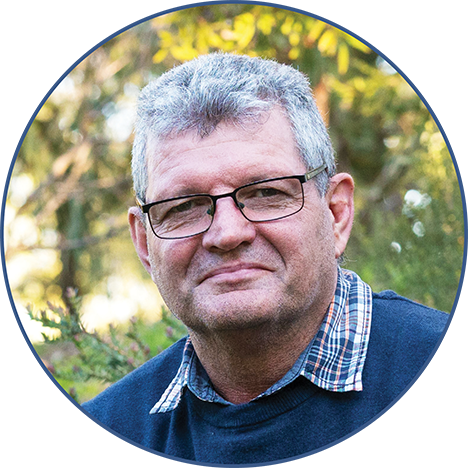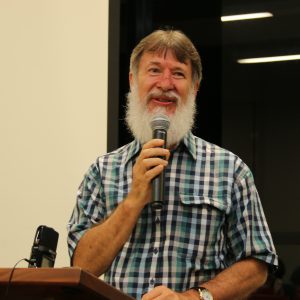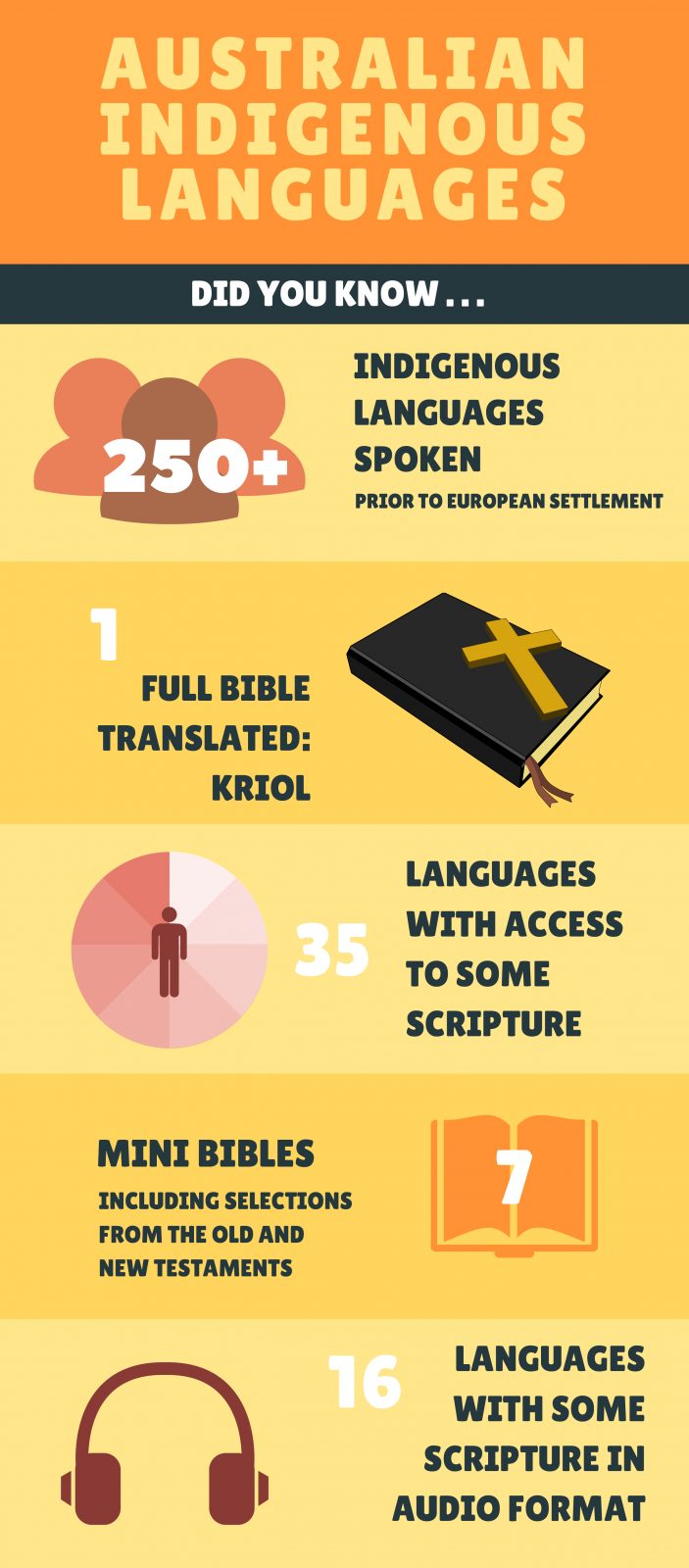Partnering in Bible translation for Indigenous Australian languages
By Max Sahl | Wycliffe Today Spring 2021
Wycliffe Australia is very proud of its members working in translation and Scripture engagement projects right here in Australia. In our own backyard, we have dozens of Australian Indigenous languages, many without adequate scriptures and many facing extinction. The opportunities for preserving Aboriginal languages and culture are huge and we are praying to the Lord of the harvest to send workers into these ripe fields.

In this edition we rejoice with our partner AuSIL (Australian Society for Indigenous Languages) as they celebrate 60 years of working with Indigenous communities to record languages and give God’s Word to people in a way that speaks to their soul.
I was privileged to meet some of these committed people on a recent trip to Darwin and Alice Springs: Melody Kube and Kathy Dadd as they ran a translation workshop in Darwin, Lucy and Alan Rogers engaging Indigenous Christians through ethnoarts, David Blackman finishing the translation work in the Alyawarr language, and Ming Fang and David Strickland getting ready to dedicate the Anmatyerr mini Bible.
I am sure you will appreciate them all the more as you read their stories, always remembering that the Lord of the universe uses ordinary people just like you and me to do extraordinary things.
Image care of AuSIL
The future looks bright: capacity building for Indigenous leaders
By Deb Fox | Wycliffe Today Spring 2021
In February this year, Dr Philip Townsend was officially inducted as the new Director for the Australia Timor Group (ATG) which oversees the Australian Society for Indigenous Languages (AuSIL) at an event in Darwin. (No, he’s not related to his namesake William Cameron Townsend, founder of SIL and Wycliffe!) Phil takes over the role from Alan Rogers, who served faithfully as interim Director for two years. Philip and his wife, Lesli, worked in a central Australian Aboriginal community and then as missionaries in Papua New Guinea.
 Philip says he has spent most of his life as a ‘guest’ in remote, cross-cultural, bilingual contexts, which developed his keen interest in cross-cultural communication and Bible translation:
Philip says he has spent most of his life as a ‘guest’ in remote, cross-cultural, bilingual contexts, which developed his keen interest in cross-cultural communication and Bible translation:
When I was 15 years old, I sensed God saying I would be a Bible teacher. He directed me to cross-cultural ministry. I became a school teacher and worked for three years in the bilingual school at Pipalyatjara community in the Aṉangu Pitjantjatjara Yankunytjatjara Lands (APY Lands) in the north west corner of South Australia. I started to learn Pitjantjatjara and was friends with Paul and Ann Eckert, who were translators among the Pitjantjatjara. I spent most of the next 23 years in Papua New Guinea as a Bible teacher at a bilingual training institution. I spoke the local language called Gogodala and was involved in assisting the Old Testament Bible translation project in that language.
Philip is passionate about training local people to be involved in the Bible translation process. He says that his experience working alongside local speakers showed him how vital their involvement is:
When I taught in the APY Lands, a new degree was offered by the University of South Australia to enable Anangu speakers to become school teachers. Each day, I worked alongside Aboriginal Education Workers in the school and assisted them in their professional development. Similarly, while I was in Papua New Guinea, I was involved in helping local staff at the training institution to enhance their skills and ran workshops for staff from several related sites. These experiences convinced me that capacity development of local people must be a priority. That applies to the areas of language development, Bible translation and Scripture engagement.
Philip’s doctoral research may offer a key to upskilling Indigenous leaders. In 2016, he finished his PhD which focused on the use of mobile devices by Aboriginal and Torres Strait Islander pre-service teachers to enhance their professional learning in community-based Initial Teacher Education programs. He shares
The use of mobile devices facilitated their ability, as adults, to be self-directed in their learning regarding place and time of study. Participants believed that use of mobile devices helped them finish work more quickly and fit with elements of their own cultural philosophies. COVID-19 travel restrictions and lockdowns make access to Indigenous language communities difficult for non-residents. Assisting Indigenous colleagues to develop their computer and online skills may facilitate communication with AuSIL staff and enable ongoing language development, Bible translation and engagement with Scripture.
Along with making new connections and implementing new training approaches to support Indigenous learning, Philip is excited about UNESCO’s upcoming Decade of Indigenous Languages (2022-2032). This presents potential opportunities for the Bible translation movement. Philip says he hopes that Aboriginal and Torres Strait Islander peoples will have opportunities to visit and learn from other indigenous people from around the world who are managing their own activities in language development, Bible translation and Scripture engagement. He is also excited about possible new partnerships and the involvement of more Indigenous people at a higher organisational level:
I pray that structural changes will occur in the ATG so that Aboriginal and Torres Strait Islander peoples join the staff of ATG and have a voice in its leadership and governance.
Please join us in praising God for:
- AuSIL’s 60th celebration events in Sydney (online,11 September), Melbourne and Alice Springs (both on 9 October) and Darwin (13 November)
- upcoming printing of two new translations: the Plain English Version and Murrinhpatha (a language in Wadeye, Northern Territory) with dedications likely in early 2022.
Pray for:
- recruitment of more people with a passion to work alongside Aboriginal and Torres Strait Islander peoples in language development, Bible translation and Scripture engagement
- UNESCO’s Decade of Indigenous Languages (2022-2032) to bring new opportunities and partnerships with language communities.
Photos: Steven Miles
Always learning: the changing landscape of Indigenous translation
Wycliffe Today| Spring 2021
David Blackman has been working with Alyawarr speakers of Central Australia for almost 30 years. We caught up with David to find out what he has discovered during that time.
What does a typical Bible translation facilitator look like in an Indigenous community?
I’m not sure there is one! For me, a Bible translation facilitator is someone who engages with people. You don’t come as an expert. You don’t come to fix anything or teach anyone. You come to learn. That’s where it all begins. Any opportunity to learn from the local people, whether it’s hunting with them or watching them paint, watching them fix cars – anything like that to start relationships and discover more about culture and language.
What influenced your decision to move to Epenarra as a translation facilitator?
When I worked for the Northern Territory Education Department in 1980-82, I recall noticing how little English was spoken in remote communities. It occurred to me how little people would understand English Scripture. Why would they?
You had around 10 years experience living in Central Australia before joining Wycliffe Australia and being seconded to AuSIL in 1990. What changes have you observed amongst the people and languages over the past 40 years?
Things were very different in 1980. In remote communities, there was no electricity, few schools, no phones, often no shops, housing was very basic. When I first visited, there were many people living in humpies. Ten years later, when I returned to the Territory, there was better housing, sometimes electricity and usually a community pay phone. In recent years, mobile phone coverage has reached many remote communities. Increasing contact with the wider culture and more educational opportunities have opened up. Unfortunately, this contact has also brought about a decline in the use of local languages.
Have you noticed a change in the way young people perceive or identify with their language since more of the Bible and dictionary has been translated?
Traditional languages are being used less by people under the age of 20, but many of them actually get excited about hearing the audio Bibles in their mother tongue. Young people mix their traditional languages with English, so they develop a unique, hybrid way of speaking. They like to read from the Plain English Version Bible, as the structure is similar to traditional Aboriginal languages.
When Alyawarr speakers first see their language in print, they have to get over the hurdle of the fact that it doesn’t look like English. Those who are able to do that can transfer the English literacy they gained at school to reading Alyawarr, and some find that they enjoy it. Having said that, people are always delighted to have Scripture available in their own language, readers and non-readers alike. More people these days choose to access it in audio format.
What is the next project on the go?
We’ve been translating Revelation for a number of years and we’re getting close to the final stages of checking the Epistles of 1 and 2 Peter.
What is the biggest challenge in your ministry and how has it grown your faith?
I have learned that things hardly ever happen the way I expect! Inevitably, God has a better plan. There are so many variables in cross-cultural ministry that can affect what happens. We need to be flexible enough to cope with whatever comes. We are always learners! I used to have a poster on my wall that said ‘Blessed are the flexible, for they shall not be broken’! We learn to depend on the Lord. It teaches us to pray and seek God’s guidance on a daily basis.
Please pray for:
- wisdom in balancing different roles
- the ability to finish the task well
- young people to join the Alyawarr team.
Nobody else has a message like that
Wycliffe Today | Spring 2021
Kathy Dadd is a Wycliffe Australia member working with the Australian Society for Indigenous Languages (AuSIL) on a translation of the Bible called the Plain English Version (PEV). It is a meaning-based English translation of the Bible that ‘seeks to use language features that are common to most Australian Aboriginal languages’ in order to communicate clearly to speakers of Australian Indigenous languages who do not use Standard English.
Kathy says she has always been interested in other languages. Studying Aboriginal Studies at university also opened Kathy’s eyes to the ongoing disadvantages experienced by Australian Indigenous communities:
When I heard that there were Australians who don’t have the Bible in a language they could easily understand, I found myself wondering whether it was something I could be involved in. I heard that there are still lots of Aboriginal languages being spoken and only one language has the whole Bible available (Kriol).
The PEV Mini-Bible (about 70% of the New Testament and a few excerpts from the Old Testament) is due to be published soon but Kathy says that there is still a ‘lifetime of work’ to get other books translated and audio recordings made to help with Scripture engagement:
It’s exciting to know that the PEV Mini-Bible has been sent to the publisher after many years of hard work that Dave Glasgow and others have put into it. It’s also encouraging when we get requests for more books to be translated because we know that people are using it and finding it helpful. But it does remind me how much there is to go!
With a few years of experience now under her belt working on the PEV, what is Kathy looking forward to in the future?
I’d love to see the whole Bible available in the PEV one day, so I plan to continue working on the PEV as my main project. I’m also encouraged by the many Aboriginal people who want to translate the Scriptures into their own languages. I want to support them in that work. We recently had a week-long workshop where 11 Aboriginal people came to Darwin and translated Luke 2:6-12 into six languages. For most of them, it will be the first Scripture ever published in their language. It’s such a privilege to be a part of that!
Working alongside local translators has also shown Kathy how hard it can be to clearly communicate the importance of the gospel message:
God’s Word has the power to transform lives, so we really want to make sure that a Bible translation is communicating clearly, but that’s not without its challenges. At a recent translation workshop, I found out that some languages don’t have words for things like ‘save’, ‘animal’, ‘box’ or ‘world’.
Even native English speakers have found the PEV helpful for understanding Bible passages in a new light. A particular passage which has stood out to Kathy from the PEV is John 6:68:
Your words will make us live with God forever. Nobody else has a message like that.
John 6:68b (PEV)
Indeed, no one else has a message like the one we read in God’s Word. Translations like the PEV enable language communities to understand the unique message of God’s love, grace and forgiveness.
Please pray for:
- more workers to help with the PEV
- more workers to support Indigenous translators.
For more information, go to https://wycliffe.org.au/member/kathy/
Australian Indigenous Languages

How much do you know about Australian Indigenous Languages?
Test your knowledge here:



 Philip says he has spent most of his life as a ‘guest’ in remote, cross-cultural, bilingual contexts, which developed his keen interest in cross-cultural communication and Bible translation:
Philip says he has spent most of his life as a ‘guest’ in remote, cross-cultural, bilingual contexts, which developed his keen interest in cross-cultural communication and Bible translation:

 Thanks for your patience...
Thanks for your patience...